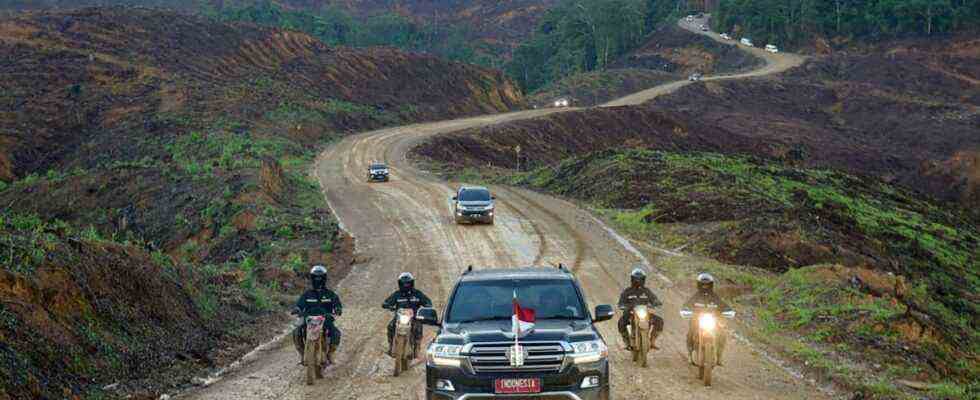Traffic is talked about in Jakarta like the weather is talked about elsewhere. How long it took you to get to work and back. When it flows particularly slowly, when almost nothing works at all. Whether you’ve spent three or four hours in the car behind tinted windows listening to music, watching the news, brushing your teeth or having a baby. Anything happens.
A person who is born in Jakarta and also dies there spends ten years of their life on average stuck in traffic, according to the Indonesian author Seno Gumira Ajidarma. The metropolitan region with its more than 30 million inhabitants has been called the worst traffic juggernaut in the world several times. More than three million people drive from the outskirts to the city center every day, many in air-conditioned cars, protected from infection.
All this could be different in Nusantara. This is the name of the new capital being built on the island of Borneo. Construction has been in the works for some time, but just yesterday the country’s development minister, Suharso Monoarfa, announced the name, which he had just learned from President Joko Widodo. Nusantara is the Indonesian term for archipelago, it was formerly used for the entire country.
President Widodo had promised to move the capital when he was re-elected in 2019. Showing an alternative to hopelessly overstretched Jakarta was politically imperative, because Jakarta not only suffers from traffic, but also from air pollution and, since it is located by the sea and has been slowly sinking for years, from floods.
A new capital from the drawing board is not uncommon
Of course, the relocation of the capital to Borneo is also expected to provide economic momentum for the country. Nusantara will be much more centrally located than Jakarta. The island state with over 270 million inhabitants is not only the largest Muslim country in the world, it also extends over 17,000 islands. Many are uninhabited, but Java, where Jakarta is located, has half the population in less space than Borneo.
Borneo is Asia’s largest island, twice the size of Germany. There, Nusantara will be built in East Kalimantan province, some 2,000 kilometers from Jakarta, which is set to remain Indonesia’s financial hub. The new capital will then also be on the coast, but the region will be significantly less affected by weather phenomena.
Such a capital move is not totally unusual, Brasilia, Canberra and also the capital of Myanmar, Naypyidaw, were designed on the drawing board. A new capital for Egypt is currently being built a few kilometers from Cairo.
The corona pandemic has delayed the construction of Nusantara, but now it is to be pushed ahead at full speed. Indonesia needs economic stimulus to recover from the past two years. Almost 29 billion euros are planned for the entire project. Parts of the government are to move as early as 2024, and a ten-year plan envisages that government business will be conducted entirely from Nusantara by 2034. Widodo will then no longer be in power, as Indonesian electoral law only allows two terms for presidents. Nusantara would be Widodo’s legacy.
The people in the area of the new capital fear being displaced
So far, however, where the new capital will soon be located, there is mainly dense forest. Or more and more cleared area. The Indonesian Magazine Benar News reported a few weeks ago that residents were worried about being driven out of the area. Jubein Jafar, a leader of the Dayak, as the non-Muslim, indigenous people on Borneo are called, welcomes the planned move to the underdeveloped area. But its people, who have lived in the region for a long time, often do not have ownership rights. Indonesia came into being in its present form in 1945.
“Maybe we can’t keep our land and what will happen to our crops?” says the 55-year-old. In the area around Sepaku, the neighboring town of the new capital, many people live off palm oil or rubber. Indonesia is the world’s largest palm oil producer, and there is massive deforestation and conversion to palm plantations in Borneo. Several animal species, including the orangutan, are massively threatened as a result.
Many of Sepaku’s 36,000 residents fear that the construction of a glittering new city in the middle of the forest could destroy their communal way of life. They have asked the government for financial compensation and new land. “We have to preserve our culture and our customs,” says Jubein Jafar. “I’m afraid we’ll just be evicted in such a way that they’ll tell us to just move and grow somewhere.”
The concern is justified. When Brasilia, now a UNESCO World Heritage Site, was built in the 1960s as a model and capital for Brazil, an egalitarian concept was in mind, that a judge should have the same living space as a caretaker. But the workers were forgotten. The people who came to build the city stayed and eventually had to be expelled when the city was inaugurated.

